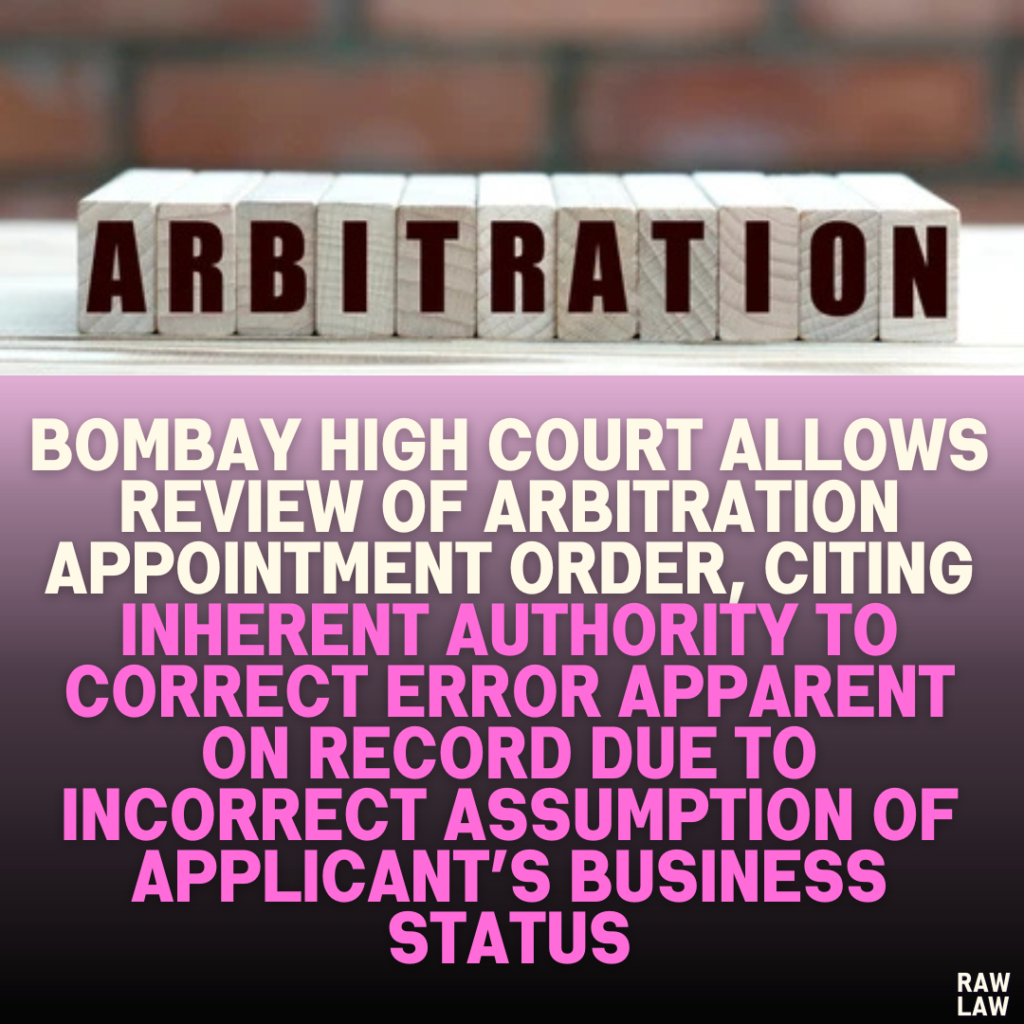Court’s Decision:
The Bombay High Court reviewed and recalled its earlier order dated 19.12.2023, which dismissed an application for the appointment of an arbitrator under Section 11(6) of the Arbitration and Conciliation Act, 1996. The review was granted due to an error apparent on the face of the record—the earlier decision incorrectly assumed the applicant’s business, R-Cube Energy, to be a partnership firm instead of a private limited company. Consequently, the application was restored and referred to the appropriate bench for reassessment.
Facts:
The petitioners filed an application under Section 11(6) of the Arbitration Act, seeking the appointment of an arbitrator based on a clause in an investment agreement dated 02.02.2018 between R-Cube Energy (the applicant’s business) and Windsor Machines Limited (respondent). The application was dismissed by the court in its 19.12.2023 order, which accepted the respondent’s argument that R-Cube Energy, presumed to be a partnership firm, could not invoke the arbitration clause unilaterally without all partners’ consent.
Issues:
- Maintainability of the Review Petition: Could the High Court exercise review jurisdiction over an order passed under Section 11(6) of the Arbitration Act?
- Error in Business Classification: Did the court’s earlier order rely on an incorrect assumption that R-Cube Energy was a partnership firm rather than a private limited company?
Petitioner’s Arguments:
- The petitioners argued that the High Court, as a constitutional court, had inherent power to review its decisions and correct records under Article 215 of the Constitution.
- They asserted that the earlier dismissal order was based on an error regarding R-Cube Energy’s status, which had transitioned to a private limited company in June 2019.
- They cited Supreme Court rulings, emphasizing that post-2015 amendments to the Arbitration Act vested appointment power in the courts, making review petitions maintainable in such cases.
Respondent’s Arguments:
- The respondent contended that the Arbitration Act does not expressly provide for review powers in Section 11 applications, arguing that this power could not be exercised absent statutory provision.
- They referenced prior rulings, including Antikeros Shipping Corporation vs. Adani Enterprises Limited, which held that Section 11 orders were not subject to review.
- They claimed that, since petitioners argued in the original hearing as if R-Cube Energy was a partnership firm, they should not be allowed to alter this factual foundation post-decision.
Analysis of the Law:
The court examined relevant provisions of the Arbitration Act and determined that, after the 2015 amendments, High Courts exercise judicial power under Section 11(6), a power previously vested in the Chief Justice. Given this change, the High Court now functions as a court of record, vested with the inherent power to correct errors on its record. Article 215 empowers the High Court to address such issues even if specific statutory authority is absent.
Precedent Analysis:
The court referred to judgments that distinguish pre- and post-amendment interpretations of the Arbitration Act. Notably, the court highlighted the Supreme Court’s decision in Pushpalata Jain vs. Raj Enterprises and other High Court decisions that have recognized the inherent review power of courts post-2015 amendments.
Court’s Reasoning:
The High Court held that, as a constitutional court and court of record, it has inherent authority to review its records to rectify evident errors, especially in cases of altered facts due to legislative changes. It observed that the court had incorrectly based its earlier order on the assumption that R-Cube Energy was a partnership, which affected its consideration of Section 19(2)(a) of the Partnership Act. Upon recognizing the firm’s correct status as a private limited company, the court found the original dismissal order unsupported by the factual record.
Conclusion:
The High Court ruled that the review petition was maintainable, acknowledged the error apparent on the record, and recalled its order dated 19.12.2023. The matter was reinstated to be heard by the appropriate bench for fresh consideration.
Implications:
This ruling reaffirms the Bombay High Court’s authority to exercise review jurisdiction in arbitration matters under Section 11, even in the absence of specific statutory provisions, where the court’s inherent powers under the Constitution are at play. The decision underscores the judiciary’s responsibility to maintain accurate records, emphasizing the importance of statutory amendments that alter judicial processes.



